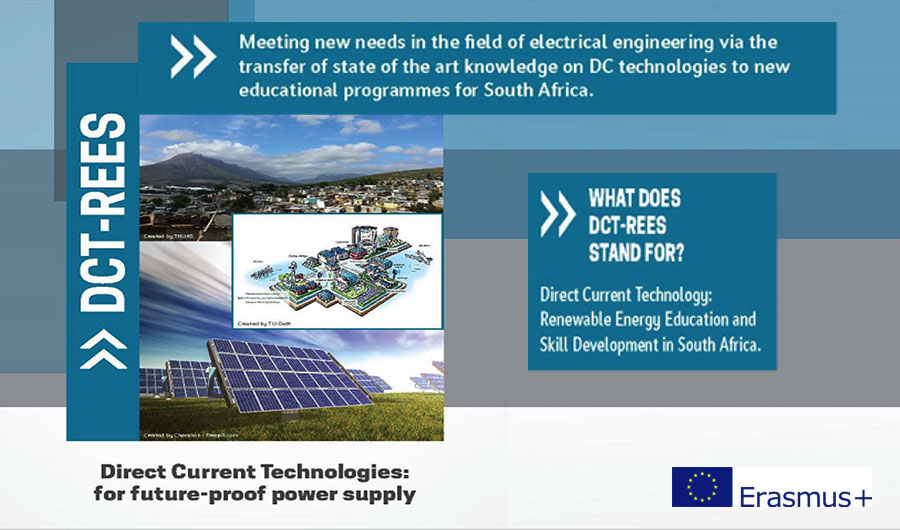DCT-REES Menu
Departments Engineering & the Built Environment
- Architecture
- Chemical Engineering
- Civil Engineering and Geomatics (Durban)
- Civil Engineering (Midlands)
- Construction Management and Quantity Surveying
- Electrical Power Engineering
- Electronic and Computer Engineering
- Industrial Engineering
- Mechanical Engineering
- Town and Regional Planning
- Urban Futures Centre
The project has ended 01 October 2021
DC AS FUTURE ENERGY CARRIER
Anyone who is familiar with the early history of the utility industry knows that a battle raged over whether the electric grid should be Direct Current (DC) or Alternating Current (AC). Thomas Edison and General Electric favoured DC while Nikola Tesla and Westinghouse thought AC would be best. Ultimately, AC power won out because of the ease of changing voltage levels with a transformer. So today, with few exceptions, the electric grid is predominately AC. However, it appears that DC may be on the verge of a comeback of sorts. Digital equipment, solar PV, batteries, electric vehicles and other end-use devices all require DC power.
DC grids can manage much longer distances than the current low-voltage on AC. A DC grid is less susceptible to interference and leads to less energy losses. DC grids can carry the same level of power over thinner lines, compared to the existing AC grid, making a DC grid more sustainable. Also, the DC grid is free of electrolytic capacitors, so that the lifetime of the DC drivers is longer than the AC drivers.
Next to the benefits above, many additional features can easily be implemented by making DC grids also Smart Grids. Embedded systems can control the energy demand and energy flow from source to consumers. Intelligent algorithms are able prevent hazards in case of short-circuits and open connections. External storage devices as electric vehicles can be integrated temporarily for charging or to deliver even more energy. These benefits will make DC grids and DC Smart Grids the preferable choice for the future.
Direct Current-technologies are rapidly gaining attention worldwide because of its efficiency and potential for sustainable solutions. In order to supply the country and its industry with adequately trained professionals in the field of electrical and electronics engineering, this project aims to develop and implement a new educational program, with new courses and materials on DC-technologies for South African universities (Electrical and Electronics Engineering).
Access to the content developed in this project:
For a detailed overview of all the educational content the partners have developed, please download the summary of all Notes here.
For more information or access to the results and to learn about the outcomes to this project please visit the DCT REES project pages on the Xdemia platform. Using the Xdemia platform it is possible not only to access the materials themselves but also to contact the authors and owners of the materials with specific questions if you, your company or your institute is interested in using the materials even if you have not been a partner in this project.
Contact Information
https://xdemia.com/space/dct-rees-public-space (free)
https://xdemia.com/space/dct-rees-central (free, log-in required)
Erasmus Page Link: https://erasmus-plus.ec.europa.eu/projects/search/details/586190-EPP-1-2017-1-NL-EPPKA2-CBHE-JP (project itself)
https://ec.europa.eu/programmes/erasmus-plus/projects (project results database of all projects)


